617 Search Results for tell me about it
September 9, 2013
by Robin Parker -
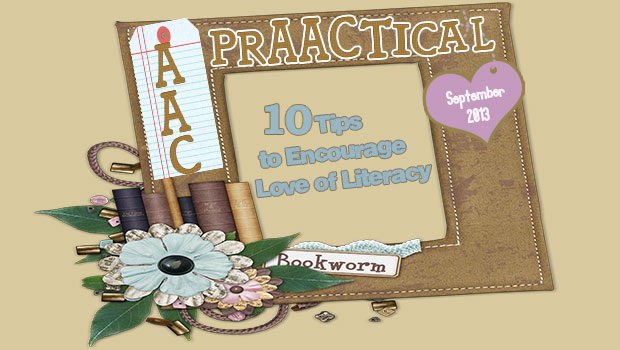
Reading and writing are modalities of language (just like listening & talking). The more we integrate literacy into language learning the more opportunities for prAACtice and learning. Think of all the ways to prAACtice core words with reading and writing (e.g., “read again”, “write about that”, “that is good”, “He was bad”, “tell me more”, “I know”, etc…). With this in mind, we love encouraging a love of literacy for ALL of our students. Here are some top tips we have learned from the most reluctant reader/writers, to beginning reader/writers, to even the more proficient readers/writers. It is such a great pleasure to watch students begin to love literacy as much as we do. Use high interest books– Find books with super high interest pictures and/or text. For some learners, it helps to create your own books with personal interest photos and/or topics. One (very) reluctant reader we know, loved... [Read More...]
September 4, 2013
by Robin Parker -
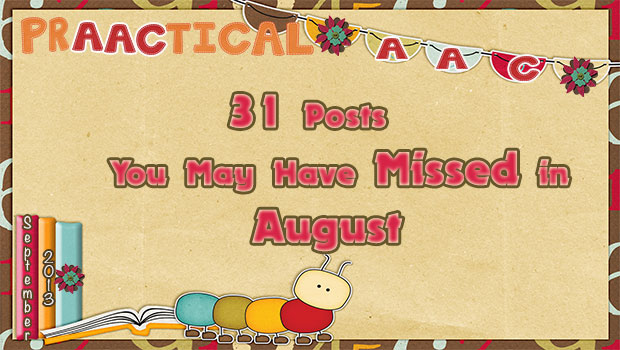
Strategy of the Month Back to School with AAC AAC ‘Must Haves’ for the Classroom & Speech Room PrAACtical Partnerships: AAC & Academics AAC Around the School and Beyond Core Words & the Curriculum PrAACtical Thinking 5 Things to Remember About AAC Technology Fun Friday Commenting to the Max 31 Posts You May Have Missed in July Keep Calm & …………. Great Music Apps & AAC Language Goals 5 Free Resources for Making Communication Boards & Visual Supports 5 Reasons to Say Yes to ‘NO’ Magic Moments with Tellagami Watch It Wednesday: AAC Core Word Vocabulary teaching by Gail Tatenhove & Robin 5 Ways to Use Sequenced Message SGDS and APPS 7 Writing Apps & Activities for ALL Writers PrAACtical Uses of QR Codes Watch This: Example of Teaching Expressive Language with the iPad & AAC Device by the Awesome AAC Chicks 5 Things to Consider About Data Collection in... [Read More...]
September 3, 2013
by Carole Zangari -
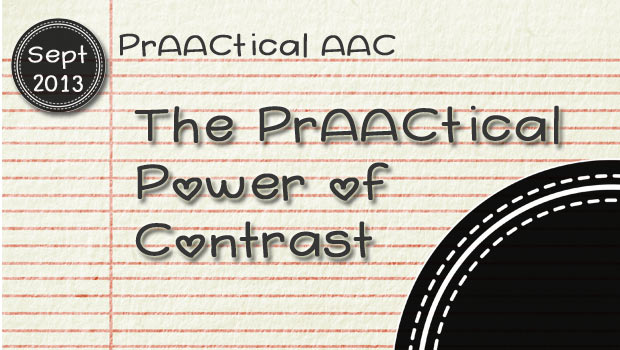
It’s a(nother) new semester for us and that means we get the chance to work with a whole new crop of graduate student SLPs who are learning to provide AAC services for the very first time. It just doesn’t get any better than that! One of the challenges for all beginning clinicians is deciding what intervention strategies to use to facilitate their clients’ learning in various areas. Recently, I had a wonderful conversation about the power of contrastive examples. I was taught this strategy by Dr. Ed Kame’enui and still use his ‘glerm’ activity today to illustrate the concept. The ‘glerm’ activity was quick way to demonstrate how to use carefully chosen examples to teach a new concept. Here’s the activity. You have to use your imagination and pretend this is a demonstration rather than a paper-and-pencil activity, but you’ll get the idea. And glerm is….? If I did a good... [Read More...]
August 31, 2013
by Robin Parker -
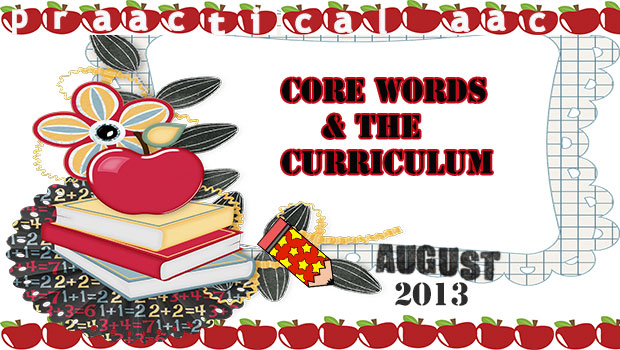
Core words can easily be incorporated into academic curriculum. There just needs to be systematic planning for core word vocabulary and then of course the joining of fringe words. One of the best visual explanations of core words is in the now ‘famous’ you tube video Language Stealers (HD). If you have not seen it, it is worth watching for many reasons but in the context of this post, it perfectly illustrates how you can teach about Greek and Roman history with core words. Planning for Core Words for the Classroom (& ALL School Activities) Have the core word communication board with you at ALL times– If you (SLP/Educator) have your core word communication board, you can model and teach the target core words during all lessons. A premise of this approach is that the student has access to their core word vocabulary display on a no-tech communication board or on their... [Read More...]
August 30, 2013
by Robin Parker -

by Carole Zangari, originally published on August 27, 2012 “How was school?” (Good) “What did you do?” (Nothing) This scenario plays out in many cars and kitchens in the after school hours and it can be hard to know who is more frustrated: the kids for being asked or the parents for not getting satisfactory answers. And still, we repeat the process day after day. Of course, we want to know the fine details of what happened and how our children felt, but in some cases, we’d settle for ANY school-related conversation at all. I’ll be the first to admit that it took me way too long to get the hang of how to get information about my children’s school days, and it seemed like just when I did, pow! They were pre-teens and then teenagers. New rule book. Here are some ‘lessons learned’ along the way about those afterschool conversations and... [Read More...]
August 24, 2013
by Robin Parker -
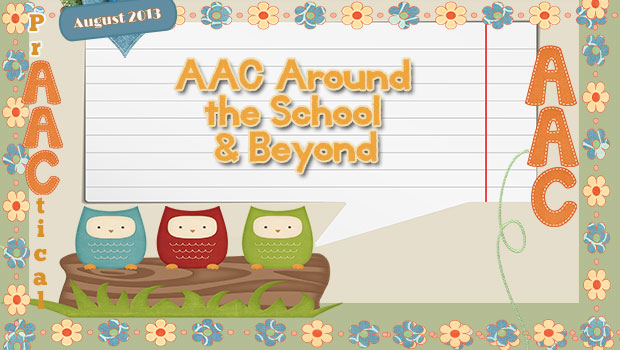
For the August Strategy of the Month, we have been thinking, writing, & talking about AAC in School. School is where AAC learners spend a large portion of their days. There needs to be multiple opportunities for students to USE and LEARN AAC each day. More than that though, we strive for full participation and interaction for students who use AAC. Students should not have to prove that they can do these things before they have ACCESS to AAC strategies and intervention. Here are some things that can be done to help build AAC participation for both students and educators. Provide ACCESS to AAC devices and visual supports throughout ALL activities in ALL places in school and on school sponsored trips/community based instruction. Provide Aided Language Input when teaching AAC to students. Use a Core Word approach when teaching AAC to students but don’t forget about Fringe Vocabulary. Learn and use partner assisted communication... [Read More...]
August 21, 2013
by Robin Parker -
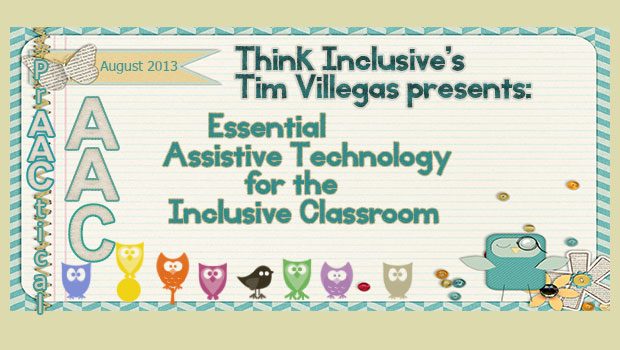
One of our wishes is that all of our students have educators like Think Inclusive’s– Tim Villegas. He has worked in special education and with people with disabilities for the past decade. He has been dedicated to talking and writing and talking about inclusion for everyone (and yes, everyone means everyone). We feel so lucky Tim is our guest blogger today. Read and learn about ‘essentials’ for assistive technology in the inclusive classroom. One of my favorite things to tell people when I discuss what kind of assistive technology (AT) to have for a particular student is to think about their strengths and build from there. In my first year of teaching students with significant cognitive and physical disabilities, one of my students was really good at pushing her foot out to make an affirmative response. So when looking at where to provide a switch or button for her to access…the natural choice... [Read More...]
August 5, 2013
by Robin Parker -

PrAACtical Thinking Free Text-based AAC Apps for the iPad PrAACtical Questions: Can Students Take Their AAC Device Home? PrAACtical AAC Learning & July 4th: Get Ready Get Set Go 4 Free July 4th Apps to SPARK Commenting 30 Posts You May Have Missed in June 4+AAC Tips for Talking About July 4th AFTER the Festivities PrAACtically Ready to Read Did You Know: AADMD Offers Specialty Webinars Visual Schedule Myths Live On..& On Getting to Yes Working with Worksheets Apps to Prepare, Learn, & Talk About Summer Vacations Modify a Battery-Operated Toy To Make It Accessible By Switches 5 Great Ways To Help People with AAC Needs Develop Inner Speech What’s the Connection: Core Vocabulary and Visual Schedules Random App of Kindness Giveaway: Talk About Food Create Your Own Style PECS Book 5 Things to Consider About Assigning ‘Homework’ to Your AAC Clients 8Friday Fun: 8 AAC Activities that are Fast... [Read More...]
July 31, 2013
by Robin Parker -
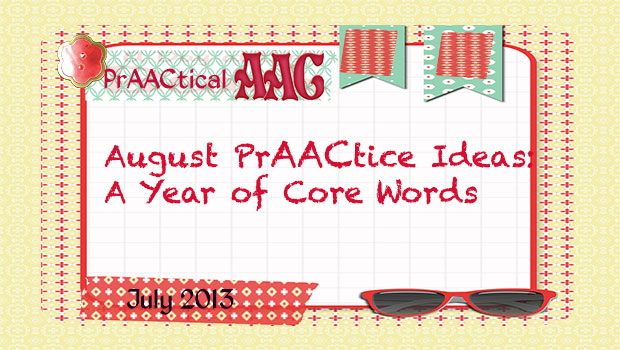
We continue to work with core words and if you have been following our ‘Year of Core Words’, here are some ways to use the August words for preparing, playing, & reading for summer fun and beginning school year activities. With some aided language modeling (ALI), repetition with variety, and meaningful language experiences, you will expand communication and core word vocabulary quickly. Stay Calm & Model On… AUGUST WORDS any like any make any drink stop any talk later any play is good bring bring it bring me some after done bring there bring more to me day fun day play is fun day go day after find day to go there fall fall down want fall big fall ready go fall give give some what give me who give that lets give him some hot more hot that is hot put hot thing there it hot not cold now job... [Read More...]
July 19, 2013
by Robin Parker -
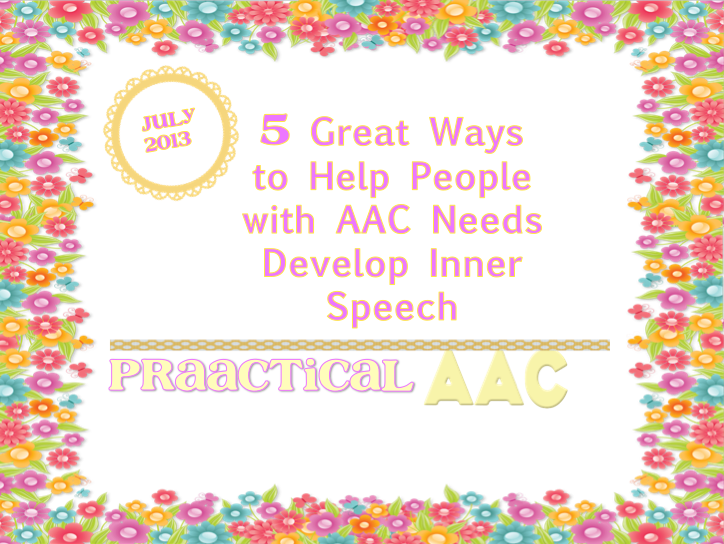
Inner speech is important. Recent research has strengthened our belief that developing inner speech is an important strategy for many people who use AAC and are working to build their literacy, sensory, and language skills. But how do we teach someone to develop that inner voice? Here are some ideas. 1. Begin by using a ‘think aloud’ strategy to make your internal thought processes obvious to the person who uses AAC. Articulating your thoughts as you work through different communication and literacy learning processes gives the learner insight into what you are thinking. Once they are used to that, it is easier to introduce the concept of private/inner speech. – 2. Use explicit instruction. “Say it to yourself.” “Say it in your head.” Using natural gestures, like tapping your temple, can be helpful as well. We’ve found that this allows us to reduce the prompting over time. Fade the verbal prompt and... [Read More...]









